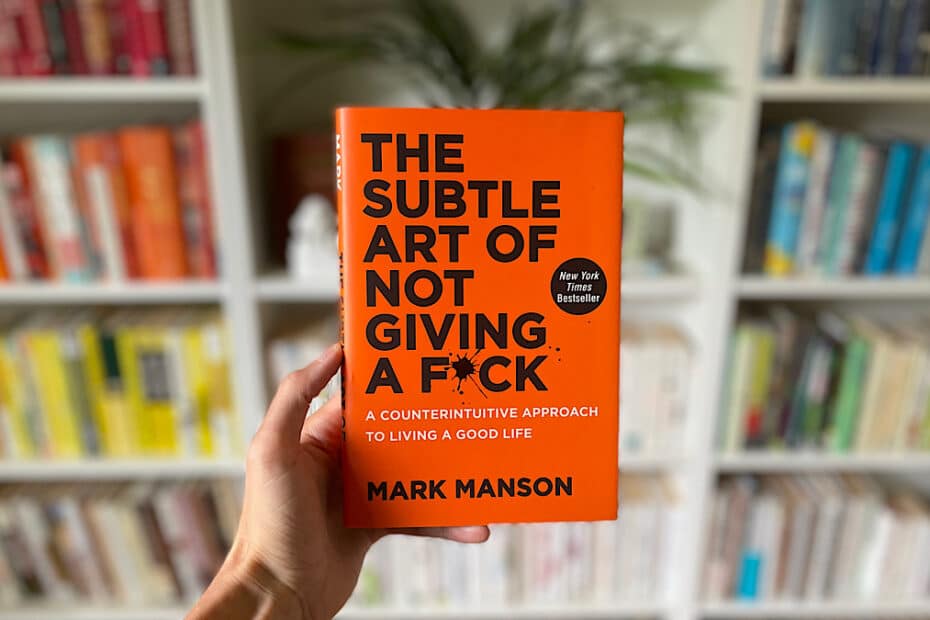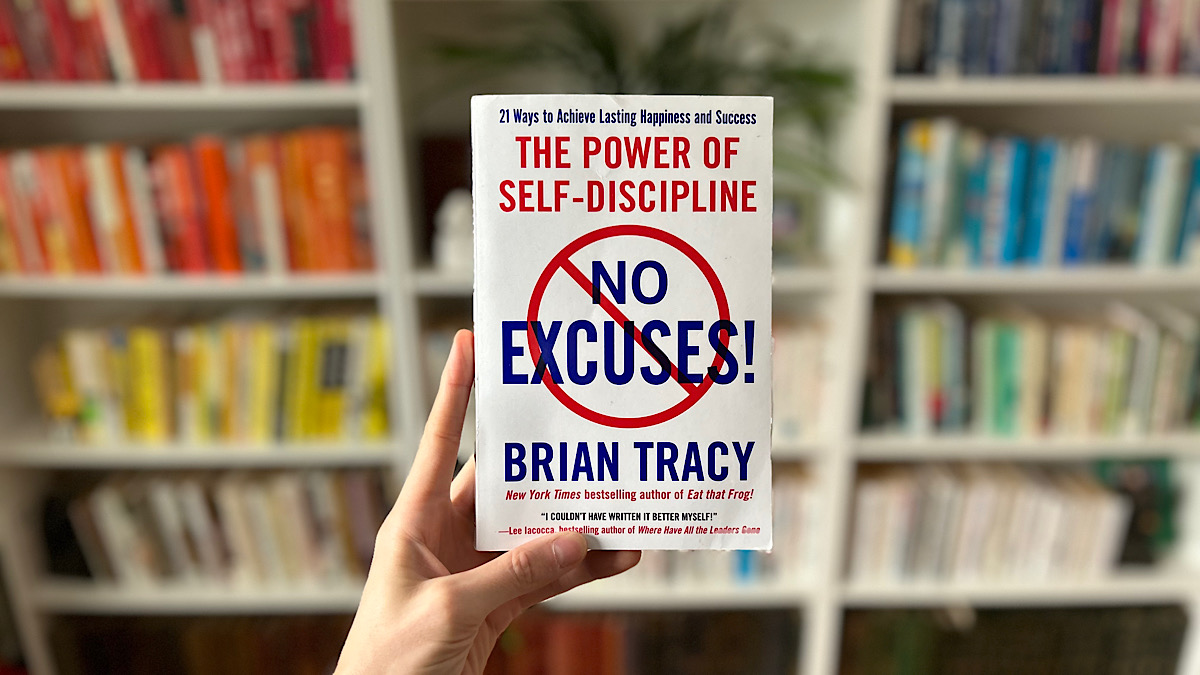Excerpt: These quotes from The Subtle Art of Not Giving a F*ck are practical and sugar-coating free. Read for a powerful kick-in-the-ass.
Click Here to jump right to our list of Quotes from The Subtle Art of Not Giving a F*ck!
Introduction: No sugar-coating here
The Subtle Art of Not Giving a F*ck by Mark Manson is a book that cuts right to the chase. In his own words he says, “Let’s be honest, shit is f**ked and we have to live with it.” And while it may sound like a grim and negative perspective on life, his advice is actually quite practical and direct and can help you turn your life around in less time than a lot of the, “sugar-coated” products available on the market today.
When it comes to success, Manson’s stance is that there will ALWAYS be a struggle in some way, shape, or form and that you should drop the notion of having a struggle-free career or living a struggle-free life—it simply won’t happen.
Moreover, it would lead to a boring existence! Problems force us to think outside of our comfort zones and challenge us to grow to stronger mental, physical, and spiritual states. The same way our bodies become stronger when challenged with resistance training and conditioning, so too does our mind and spirit become stronger with problem solving and critical thinking.
The trick, Manson suggests, is to find the problems and struggles worth challenging yourself over—the ones you actually enjoy sitting with and working to solve.
And it’s that process of continually solving problems and creatively challenging your mind, body, and spirit that lays the foundation for long-term happiness and success. It’s the same with our health and well being.
Sure, eating a sugary desert tastes fantastic and makes you feel good for the few moments that it takes for you to eat it, but it leaves you feeling like crap for a few hours (maybe longer) after it’s gone.
The same is true for sugar-coated advice—advice that leads you to avoid the problems and dodge the challenges by distracting your mind with sweet talk, cliché sayings, etc.—without giving you any practical strategies or insight that allows you to actually deal with the issues or challenges that brought you to that advice in the first place.
Long term feel-good comes from working through and solving problem(s) and challenges head on—even if we’re scared, unprepared, or don’t really know what we’re doing.
NEW In The Shop: Don’t Let The Tame Ones Tell You How To Live [Poster]
Why We ♥ It: Some of the best advice I (Matt here) ever got was: don’t take life advice from people who aren’t living a life you want to live and don’t take criticism from people you wouldn’t go to for advice. I created this poster to act as a reminder to listen more closely to our role models and less closely to our critics, trolls, and tamed-comfort-zone-hugger acquaintances. It’s also a perfect gift for the outdoor adventurer, travel enthusiast, or solo explorer (or soon to be). Available in print or digital download. 👇🏼
...Want to advertise your book, product, or service? Send inquiries to matt@movemequotes.com.
In fact, that’s how we’ll feel most of the time and it’s through that process of critical thinking and problem solving that we build our confidence, become prepared, and start to gather together a sense of what we’re doing.
But don’t be fooled—the process doesn’t end. Problems merely get exchanged and/or upgraded and you will have to begin the process anew time and time again for the rest of your life.
This is not to be perceived as a negative thing and shouldn’t put you down. This is the process of unleashing your best version and should EXCITE YOU!
…Now that you know the process, all you need to do is begin on a, “sugar-coated-free” path and face those problems and challenges head on. And while you’re solving problems and pursuing your personal version of success, remember that once you have your basic physical needs for survival met (food, clothes, shelter, etc.), all the extra money that so many people sacrifice themselves to get (doing jobs they hate, spending more time working than with family, etc.), has very little impact on overall happiness.
Work/ Life balance is more important than money and Manson references his own upbringing in a wealthy family to support that—more on that below.
Without further ado, I will now turn the insight over to Manson himself. Please enjoy our list of 32 no bullsh*t quotes from The Subtle Art of Not Giving a F*ck below and take special note of any quotes that make you smile, nod, or react in some way—it may be an opportunity for you to take an action step forward!
The List: 32 No Bullsh*t Mark Manson Quotes from The Subtle Art of Not Giving a F*ck
“There is a simple realization from which all personal improvement and growth emerges. This is the realization that we, individually, are responsible for everything in our lives, no matter the external circumstances.”
Mark Manson, The Subtle Art of Not Giving a F*ck
“Life is about not knowing and then doing something anyway. All of life is like this. It never changes. Even when you’re happy. Even when you’re farting fairy dust. Even when you win the lottery and buy a small fleet of Jet Skis, you still won’t know what the hell you’re doing. Don’t ever forget that. And don’t ever be afraid of that.”
Mark Manson, The Subtle Art of Not Giving a F*ck
“We all get dealt cards. Some of us get better cards than others. And while it’s easy to get hung up on our cards, and feel we got screwed over, the real game lies in the choices we make with those cards, the risk we decide to take, and the consequences we choose to live with. People who consistently make the best choices in the situations they’re given are the ones who eventually come out ahead in poker, just as in life. And it’s not necessarily the people with the best cards.”
Mark Manson, The Subtle Art of Not Giving a F*ck
“We all have values for ourselves. We protect these values. We try to live up to them and we justify them and maintain them. Even if we don’t mean to, that’s how our brain is wired. If I believe I’m a nice guy, I’ll avoid situations that could potentially contradict that belief. If I believe I’m an awesome cook, I’ll seek out opportunities to prove that to myself over and over again. The belief always takes precedence. Until we change how we view ourselves, what we believe we are and are not, we cannot overcome our avoidance and anxiety. We cannot change.”
Mark Manson, The Subtle Art of Not Giving a F*ck
“The rare people who do become truly exceptional at something do so not because they believe they’re exceptional. On the contrary, they become amazing because they’re obsessed with improvement. And that obsession with improvement stems from an unerring belief that they are, in fact, not that great at all. It’s anti-entitlement. People who become great at something become great because they understand that they’re not already great—they are mediocre, they are average—and they could be so much better.”
Mark Manson, The Subtle Art of Not Giving a F*ck
“I grew up in a wealthy family. Money was never a problem. On the contrary, I grew up in a wealthy family where money was more often used to avoid problems than solve them. I was again fortunate, because this taught me at an early age that making money, by itself, was a lousy metric for myself. You could make plenty of money and be miserable, just as you could be broke and be pretty happy. Therefore, why use money as a means to measure my self-worth?”
Mark Manson, The Subtle Art of Not Giving a F*ck
“Research shows that once one is able to provide for basic physical needs (food, shelter, and so on), the correlation between happiness and worldly success quickly approaches zero. So if you’re starving and living on the street in the middle of India, an extra ten thousand dollars a year would affect your happiness a lot. But if you’re sitting pretty in the middle class in a developed country, an extra ten thousand dollars per year won’t affect anything much—meaning that you’re killing yourself working overtime and weekends for basically nothing.”
Mark Manson, The Subtle Art of Not Giving a F*ck
“Everything worthwhile in life is won through surmounting the associated negative experience. Any attempt to escape the negative, to avoid it or quash it or silence it, only backfires. The avoidance of suffering is a form of suffering. The avoidance of struggle is a struggle. The denial of failure is a failure. Hiding what is shameful is itself a form of shame.”
Mark Manson, The Subtle Art of Not Giving a F*ck
“Denying negative emotions leads to experiencing deeper and more prolonged negative emotions and to emotional dysfunction. Constant positivity is a form of avoidance, not a valid solution to life’s problems—problems which, by the way, if you’re choosing the right values and metrics, should be invigorating you and motivating you.”
Mark Manson, The Subtle Art of Not Giving a F*ck
“The desire for a more positive experience is itself a negative experience. And, paradoxically, the acceptance of one’s negative experience is itself a positive experience.”
Mark Manson, The Subtle Art of Not Giving a F*ck
“Our most radical changes in perspective often happen at the tail end of our worst moments. It’s only when we feel intense pain that we’re willing to look at our values and question why they seem to be failing us. We need some sort of existential crisis to take an objective look at how we’ve been deriving meaning in our life, and then consider changing course.”
Mark Manson, The Subtle Art of Not Giving a F*ck
“When it comes down to it, if you feel crappy it’s because your brain is telling you that there’s a problem that’s unaddressed or unresolved. In other words, negative emotions are a call to action. When you feel them, it’s because you’re supposed to do something. Positive emotions, on the other hand, are rewards for taking the proper action. When you feel them, life seems simple and there is nothing else to do but enjoy it. Then, like everything else, the positive emotions go away, because more problems inevitably emerge.”
Mark Manson, The Subtle Art of Not Giving a F*ck
“Problems never stop; they merely get exchanged and/or upgraded.”
Mark Manson, The Subtle Art of Not Giving a F*ck
“Problems may be inevitable, but the meaning of each problem is not. We get to control what our problems mean based on how we choose to think about them, the standard by which we choose to measure them.”
Mark Manson, The Subtle Art of Not Giving a F*ck
“Happiness comes from solving problems. The keyword here is ‘solving.’ If you’re avoiding your problems or feel like you don’t have any problems, then you’re going to make yourself miserable. If you feel like you have problems that you can’t solve, you will likewise make yourself miserable. The secret sauce is in the solving of the problems, not in not having problems in the first place.”
Mark Manson, The Subtle Art of Not Giving a F*ck
“Improvement at anything is based on thousands of tiny failures, and the magnitude of your success is based on how many times you’ve failed at something. If someone is better than you at something, then it’s likely because she has failed at it more than you have. If someone is worse than you, it’s likely because he hasn’t been through all of the painful learning experiences you have.”
Mark Manson, The Subtle Art of Not Giving a F*ck
“Uncertainty is the root of all progress and all growth. As the old adage goes, the man who believes he knows everything learns nothing. We cannot learn anything without first not knowing something. The more we admit we do not know, the more opportunities we gain to learn.”
Mark Manson, The Subtle Art of Not Giving a F*ck
“Growth is an endlessly iterative process. When we learn something new, we don’t go from ‘wrong’ to ‘right.’ Rather, we go from wrong to slightly less wrong. And when we learn something additional, we go from slightly less wrong to slightly less wrong than that, and then to even less wrong than that, and so on. We are always in the process of approaching truth and perfection without actually ever reaching truth or perfection.”
Mark Manson, The Subtle Art of Not Giving a F*ck
“Happiness is a constant work-in-progress, because solving problems is a constant work-in-progress—the solutions to today’s problems will lay the foundation for tomorrow’s problems, and so on. True happiness occurs only when you find the problems you enjoy having and enjoy solving.”
Mark Manson, The Subtle Art of Not Giving a F*ck
“We all love to take responsibility for success and happiness. Hell, we often fight over who gets to be responsible for success and happiness. But taking responsibility for our problems is far more important, because that’s where the real learning comes from. That’s where the real-life improvement comes from. To simply blame others is only to hurt yourself.”
Mark Manson, The Subtle Art of Not Giving a F*ck
“The truth is that there’s no such thing as a personal problem. If you’ve got a problem, chances are millions of other people have had it in the past, have it now, and are going to have it in the future. Likely people you know too. That doesn’t minimize the problem or mean that it shouldn’t hurt. It doesn’t mean you aren’t legitimately a victim of some circumstances. It just means you’re not special. Often, it’s this realization—that you and your problems are actually not privileged in their severity or pain—that is the first and most important step toward solving them.”
Mark Manson, The Subtle Art of Not Giving a F*ck
“The more you desperately want to be rich, the more poor and unworthy you feel, regardless of how much money you actually make. The more you desperately want to be sexy and desired, the uglier you come to see yourself, regardless of your actual physical appearance. The more you desperately want to be happy and loved, the lonelier and more afraid you become, regardless of those who surround you. The more you want to be spiritually enlightened, the more self-centered and shallow you become in trying to get there.”
Mark Manson, The Subtle Art of Not Giving a F*ck
“To truly appreciate something, you must confine yourself to it. There’s a certain level of joy and meaning that you reach in life only when you’ve spent decades investing in a single relationship, a single craft, a single career. And you cannot achieve those decades of investment without rejecting the alternatives.”
Mark Manson, The Subtle Art of Not Giving a F*ck
“Consumer culture is very good at making us want more, more, more. Underneath all the hype and marketing is the implication that more is always better. I bought into this idea for years. Make more money, visit more countries, have more experiences, be with more women. But more is not always better. In fact, the opposite is true. We are actually often happier with less. When we’re overloaded with opportunities and options, we suffer from what psychologists refer to as the paradox of choice. Basically, the more options we’re given, the less satisfied we become with whatever we choose, because we’re aware of all the other options we’re potentially forfeiting.”
Mark Manson, The Subtle Art of Not Giving a F*ck
“Yes, breadth of experience is likely necessary and desirable when you’re young—after all, you have to go out there and discover what seems worth investing yourself in. But depth is where the gold is buried. And you have to stay committed to something and go deep to dig it up. That’s true in relationships, in a career, in building a great lifestyle—in everything.”
Mark Manson, The Subtle Art of Not Giving a F*ck
“While investing deeply in one person, one place, one job, one activity might deny us the breadth of experience we’d like, pursuing a breadth of experience denies us the opportunity to experience the rewards of depth of experience. There are some experiences that you can have only when you’ve lived in the same place for five years, when you’ve been with the same person for over a decade, when you’ve been working on the same skill or craft for half your lifetime. Now that I’m in my thirties, I can finally recognize that commitment, in its own way, offers a wealth of opportunity and experiences that would otherwise never be available to me, no matter where I went or what I did.”
Mark Manson, The Subtle Art of Not Giving a F*ck
“Commitment gives you freedom because you’re no longer distracted by the unimportant and frivolous. Commitment gives you freedom because it hones your attention and focus, directing them toward what is most efficient at making you healthy and happy. Commitment makes decision-making easier and removes any fear of missing out; knowing that what you already have is good enough, why would you ever stress about chasing more, more, more again? Commitment allows you to focus intently on a few highly important goals and achieve a greater degree of success than you otherwise would.”
Mark Manson, The Subtle Art of Not Giving a F*ck
“Freedom grants the opportunity for greater meaning, but by itself there is nothing necessarily meaningful about it. Ultimately, the only way to achieve meaning and a sense of importance in one’s life is through a rejection of alternatives, a narrowing of freedom, a choice of commitment to one place, one belief, or (gulp) one person.”
Mark Manson, The Subtle Art of Not Giving a F*ck
“If people cheat, it’s because something other than the relationship is more important to them. It may be power over others. It may be validation through sex. It may be giving in to their own impulses. Whatever it is, it’s clear that the cheater’s values are not aligned in a way to support a healthy relationship. And if the cheater doesn’t admit this or come to terms with it, if he just gives the old ‘I don’t know what I was thinking; I was stressed out and drunk and she was there’ response, then he lacks the serious self-awareness necessary to solve any relationship problems.”
Mark Manson, The Subtle Art of Not Giving a F*ck
“One day, in retrospect, the years of struggle will strike you as the most beautiful.”
Mark Manson, The Subtle Art of Not Giving a F*ck
“The only way to be comfortable with death is to understand and see yourself as something bigger than yourself; to choose values that stretch beyond serving yourself, that are simple and immediate and controllable and tolerant of the chaotic world around you. This is the basic root of all happiness. Whether you’re listening to Aristotle or the psychologists at Harvard or Jesus Christ or the goddamn Beatles, they all say that happiness comes from the same thing: caring about something greater than yourself, believing that you are a contributing component in some much larger entity, that your life is but a mere side process of some great unintelligible production.”
Mark Manson, The Subtle Art of Not Giving a F*ck
“The person you marry is the person you fight with. The house you buy is the house you repair. The dream job you take is the job you stress over. Everything comes with an inherent sacrifice—whatever makes us feel good will also inevitably make us feel bad. What we gain is also what we lose. What creates our positive experiences will define our negative experiences. This is a difficult pill to swallow. We like the idea that there’s some form of ultimate happiness that can be attained. We like the idea that we can alleviate all of our suffering permanently. We like the idea that we can feel fulfilled and satisfied with our lives forever. But we cannot.”
Mark Manson, The Subtle Art of Not Giving a F*ck
Afterword: Handle Problems on Your Own Terms [An Excerpt from Mark Manson]
“Imagine that somebody puts a gun to your head and tells you that you have to run 26.2 miles in under five hours, or else he’ll kill you and your entire family.
That would suck.
Now imagine that you bought nice shoes and running gear, trained religiously for months, and completed your first marathon with all of your closest family and friends cheering you on at the finish line.
That could potentially be one of the proudest moments of your life.
Exact same 26.2 miles. Exact same person running them. Exact same pain coursing through your exact same legs. But when you chose it freely and prepared for it, it was a glorious and important milestone in your life. When it was forced upon you against your will, it was one of the most terrifying and painful experiences of your life.
Often the only difference between a problem being painful or being powerful is a sense that we chose it, and that we are responsible for it.
If you’re miserable in your current situation, chances are it’s because you feel like some part of it is outside your control—that there’s a problem you have no ability to solve, a problem that was somehow thrust upon you without your choosing.
When we feel that we’re choosing our problems, we feel empowered. When we feel that our problems are being forced upon us against our will, we feel victimized and miserable.“
5 Picture Quotes from The Subtle Art of Not Giving a F*ck to Share:
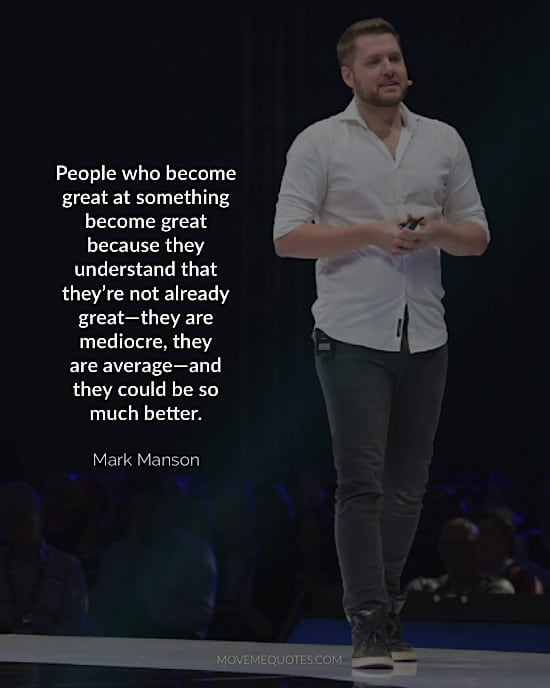
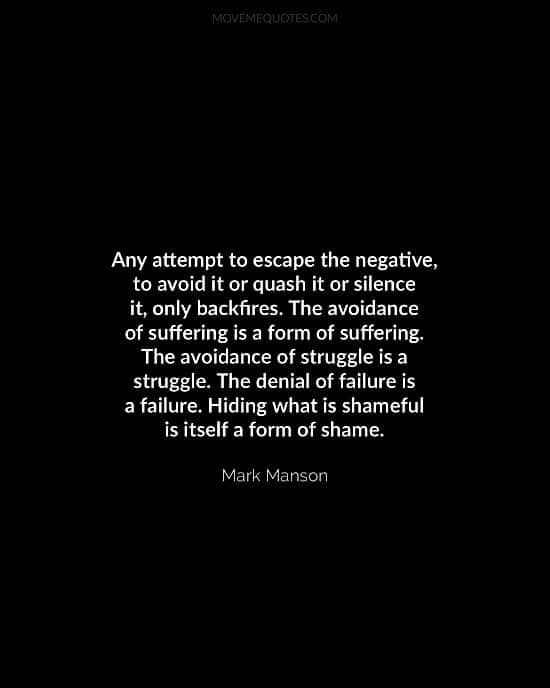
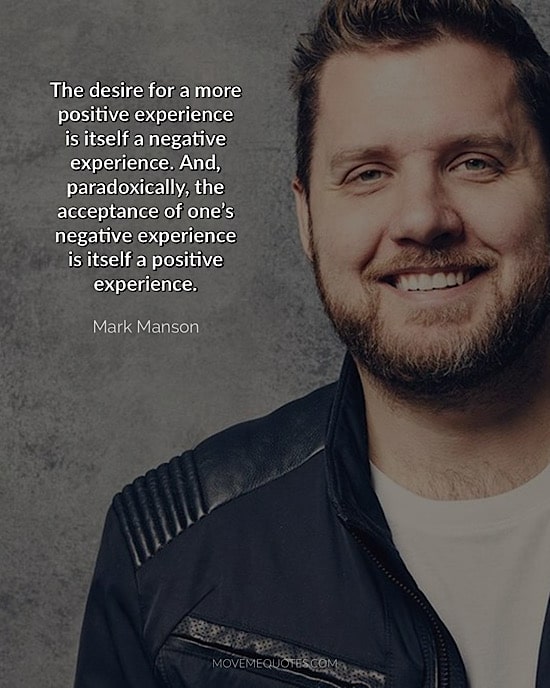
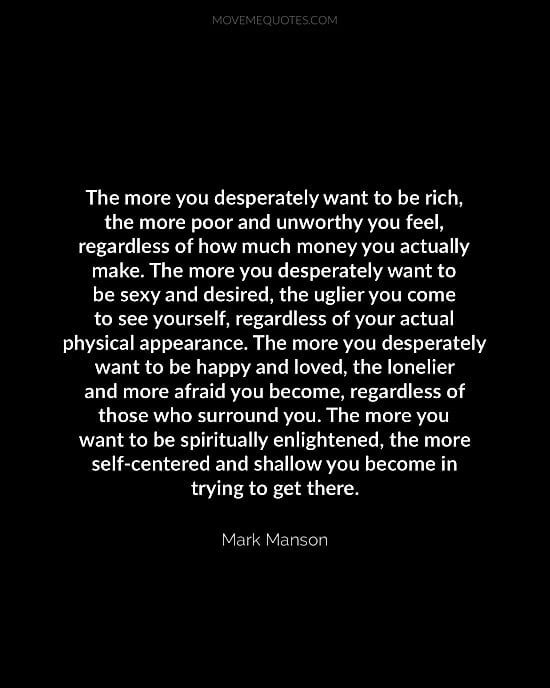
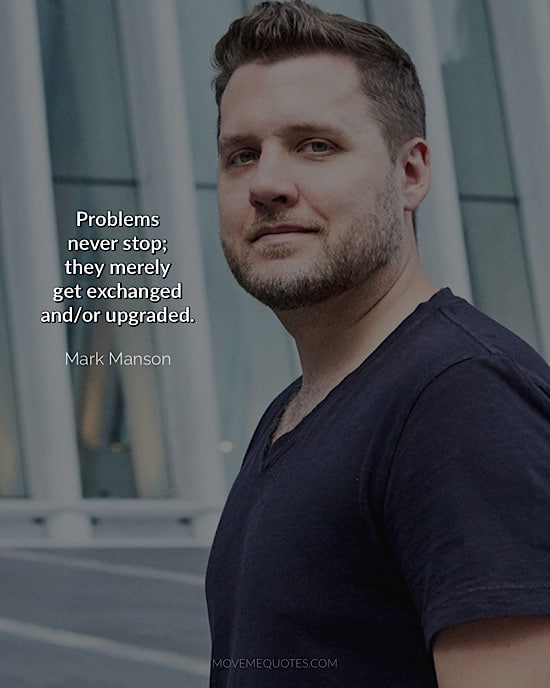
If you enjoyed these Mark Manson quotes from The Subtle Art of Not Giving a F*ck then you should read the book in full. It comes highly recommended:
Book Overview: In this generation-defining self-help guide, a superstar blogger cuts through the crap to show us how to stop trying to be “positive” all the time so that we can truly become better, happier people. For decades, we’ve been told that positive thinking is the key to a happy, rich life. “F**k positivity,” Mark Manson says. “Let’s be honest, shit is f**ked and we have to live with it.” In his wildly popular Internet blog, Manson doesn’t sugarcoat or equivocate. He tells it like it is—a dose of raw, refreshing, honest truth that is sorely lacking today. The Subtle Art of Not Giving a F**k is his antidote to the coddling, let’s-all-feel-good mindset that has infected modern society and spoiled a generation, rewarding them with gold medals just for showing up.
Buy from Amazon! Listen on Audible!
Great on Kindle. Great Experience. Great Value. The Kindle edition of this book comes highly recommended on Amazon.
Read Next:
NEW In The Shop: Don’t Let The Tame Ones Tell You How To Live [Poster]
Why We ♥ It: Some of the best advice I (Matt here) ever got was: don’t take life advice from people who aren’t living a life you want to live and don’t take criticism from people you wouldn’t go to for advice. I created this poster to act as a reminder to listen more closely to our role models and less closely to our critics, trolls, and tamed-comfort-zone-hugger acquaintances. It’s also a perfect gift for the outdoor adventurer, travel enthusiast, or solo explorer (or soon to be). Available in print or digital download. 👇🏼
...Want to advertise your book, product, or service? Send inquiries to matt@movemequotes.com.

Written by Matt Hogan
Founder of MoveMe Quotes. On a mission to help busy people do inner work—for better mental health; for healing; for personal growth. Find me on Twitter / IG / Medium. I also share daily insights here. 🌱
It has taken me 1,000’s of hours to build this free library for you. If it has helped you, you can support my continued effort here. ☕️
